Nursing Leadership and Management: Delegation in Practice - Analysis
VerifiedAdded on 2022/12/28
|7
|1624
|306
Report
AI Summary
This report provides an overview of delegation in nursing leadership and management, focusing on the roles and responsibilities of Registered Nurses (RNs) and Unlicensed Assistive Personnel (UAPs). It defines delegation as the assignment of tasks by authority to another person, crucial for efficient patient care. The report details the scope of practice for RNs and UAPs, emphasizing the importance of adhering to state board of nursing regulations and the five rights of delegation. It contrasts care delivery in the General Medical-Surgical Unit and the Intensive Care Unit (ICU), highlighting how delegation strategies differ based on patient needs. The report concludes that delegation is essential for RNs to manage their workload and provide comprehensive patient care in both unit types, ensuring adherence to established principles, rules, and regulations. The report also discusses the roles of UAPs in patient care, including medication administration, sanitation, and monitoring vital signs, and the importance of their specialized training and supervision by RNs. The report emphasizes the significance of delegation in optimizing patient outcomes and promoting a safe healthcare environment.
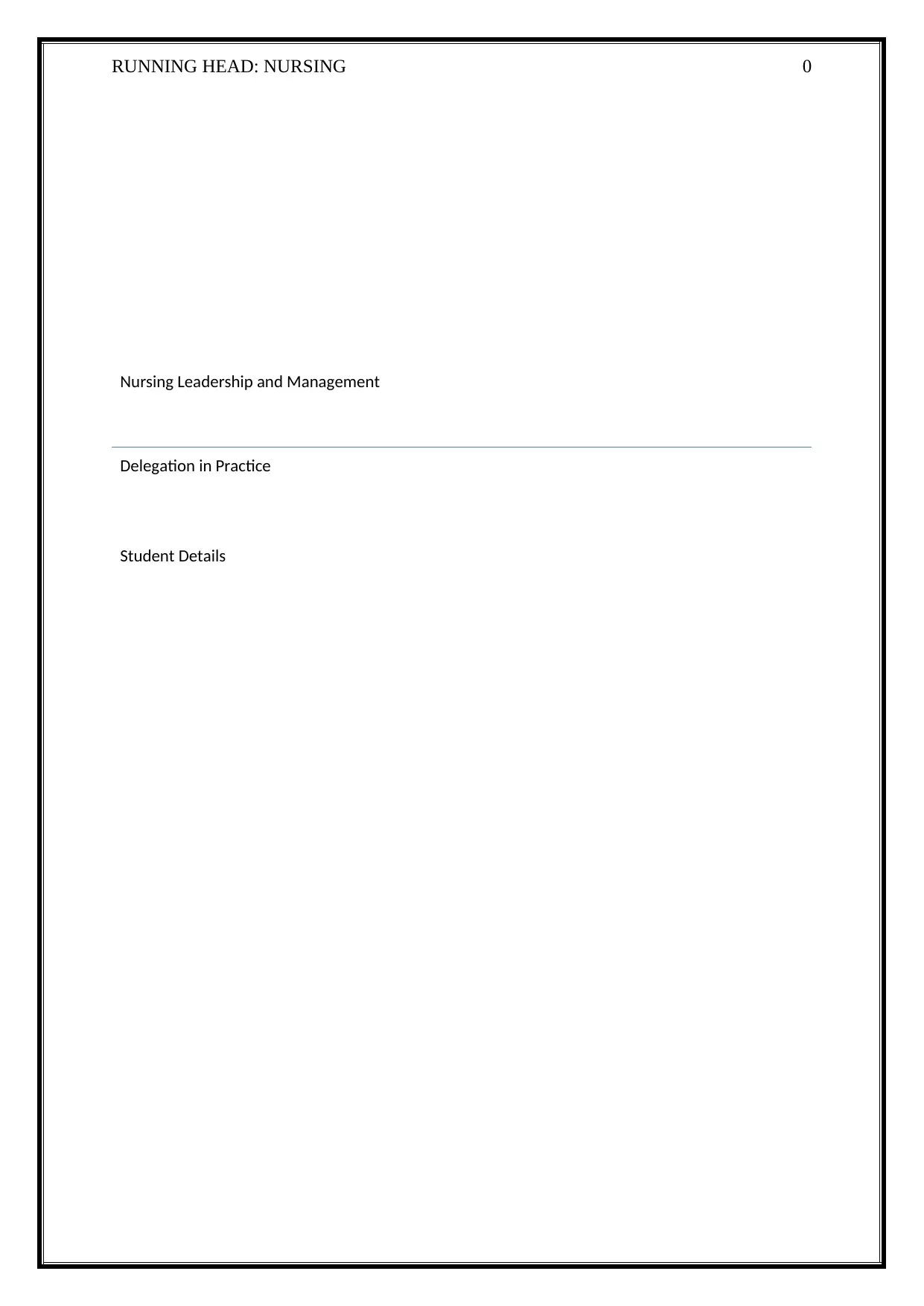
RUNNING HEAD: NURSING 0
Nursing Leadership and Management
Delegation in Practice
Student Details
Nursing Leadership and Management
Delegation in Practice
Student Details
Paraphrase This Document
Need a fresh take? Get an instant paraphrase of this document with our AI Paraphraser
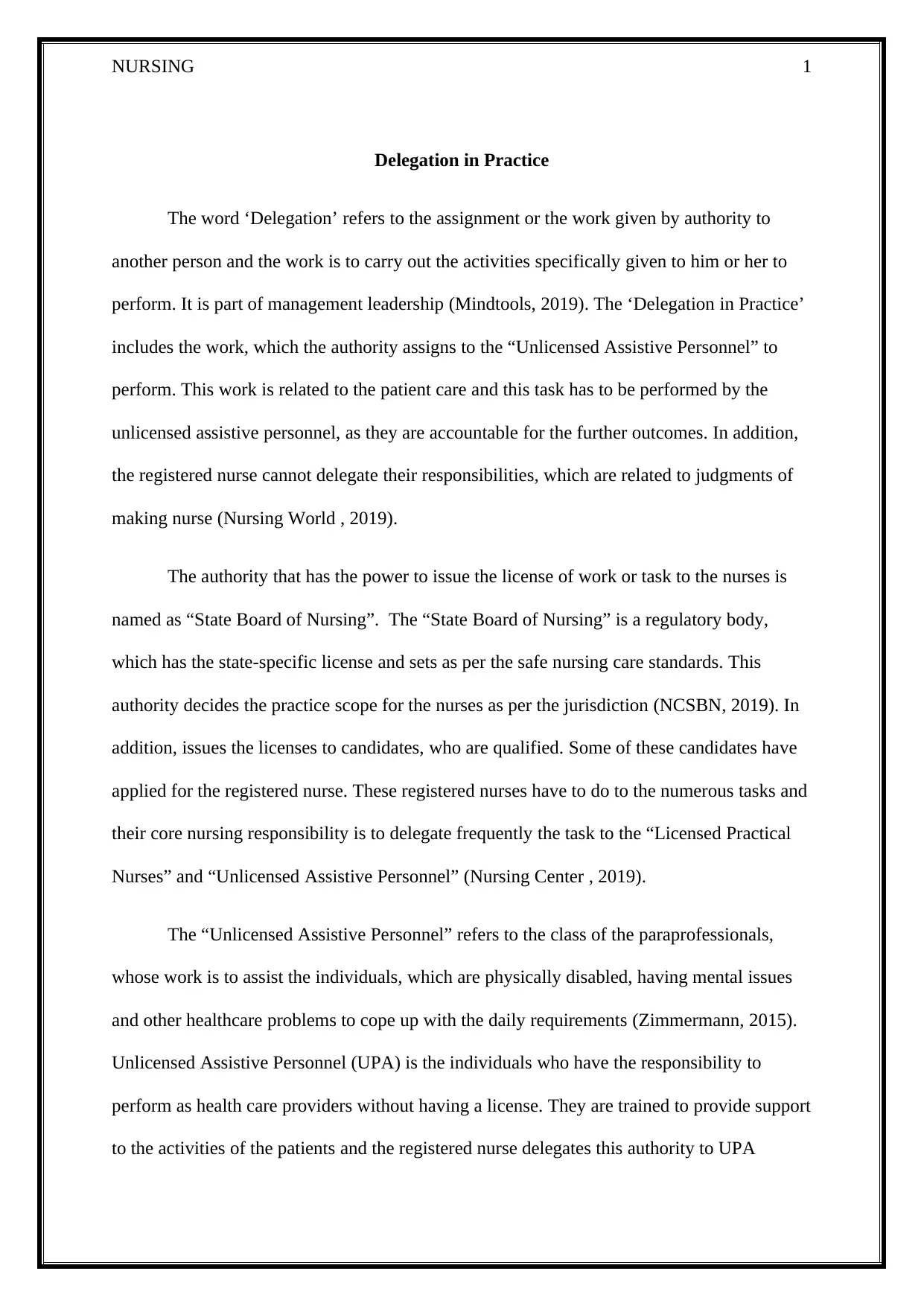
NURSING 1
Delegation in Practice
The word ‘Delegation’ refers to the assignment or the work given by authority to
another person and the work is to carry out the activities specifically given to him or her to
perform. It is part of management leadership (Mindtools, 2019). The ‘Delegation in Practice’
includes the work, which the authority assigns to the “Unlicensed Assistive Personnel” to
perform. This work is related to the patient care and this task has to be performed by the
unlicensed assistive personnel, as they are accountable for the further outcomes. In addition,
the registered nurse cannot delegate their responsibilities, which are related to judgments of
making nurse (Nursing World , 2019).
The authority that has the power to issue the license of work or task to the nurses is
named as “State Board of Nursing”. The “State Board of Nursing” is a regulatory body,
which has the state-specific license and sets as per the safe nursing care standards. This
authority decides the practice scope for the nurses as per the jurisdiction (NCSBN, 2019). In
addition, issues the licenses to candidates, who are qualified. Some of these candidates have
applied for the registered nurse. These registered nurses have to do to the numerous tasks and
their core nursing responsibility is to delegate frequently the task to the “Licensed Practical
Nurses” and “Unlicensed Assistive Personnel” (Nursing Center , 2019).
The “Unlicensed Assistive Personnel” refers to the class of the paraprofessionals,
whose work is to assist the individuals, which are physically disabled, having mental issues
and other healthcare problems to cope up with the daily requirements (Zimmermann, 2015).
Unlicensed Assistive Personnel (UPA) is the individuals who have the responsibility to
perform as health care providers without having a license. They are trained to provide support
to the activities of the patients and the registered nurse delegates this authority to UPA
Delegation in Practice
The word ‘Delegation’ refers to the assignment or the work given by authority to
another person and the work is to carry out the activities specifically given to him or her to
perform. It is part of management leadership (Mindtools, 2019). The ‘Delegation in Practice’
includes the work, which the authority assigns to the “Unlicensed Assistive Personnel” to
perform. This work is related to the patient care and this task has to be performed by the
unlicensed assistive personnel, as they are accountable for the further outcomes. In addition,
the registered nurse cannot delegate their responsibilities, which are related to judgments of
making nurse (Nursing World , 2019).
The authority that has the power to issue the license of work or task to the nurses is
named as “State Board of Nursing”. The “State Board of Nursing” is a regulatory body,
which has the state-specific license and sets as per the safe nursing care standards. This
authority decides the practice scope for the nurses as per the jurisdiction (NCSBN, 2019). In
addition, issues the licenses to candidates, who are qualified. Some of these candidates have
applied for the registered nurse. These registered nurses have to do to the numerous tasks and
their core nursing responsibility is to delegate frequently the task to the “Licensed Practical
Nurses” and “Unlicensed Assistive Personnel” (Nursing Center , 2019).
The “Unlicensed Assistive Personnel” refers to the class of the paraprofessionals,
whose work is to assist the individuals, which are physically disabled, having mental issues
and other healthcare problems to cope up with the daily requirements (Zimmermann, 2015).
Unlicensed Assistive Personnel (UPA) is the individuals who have the responsibility to
perform as health care providers without having a license. They are trained to provide support
to the activities of the patients and the registered nurse delegates this authority to UPA
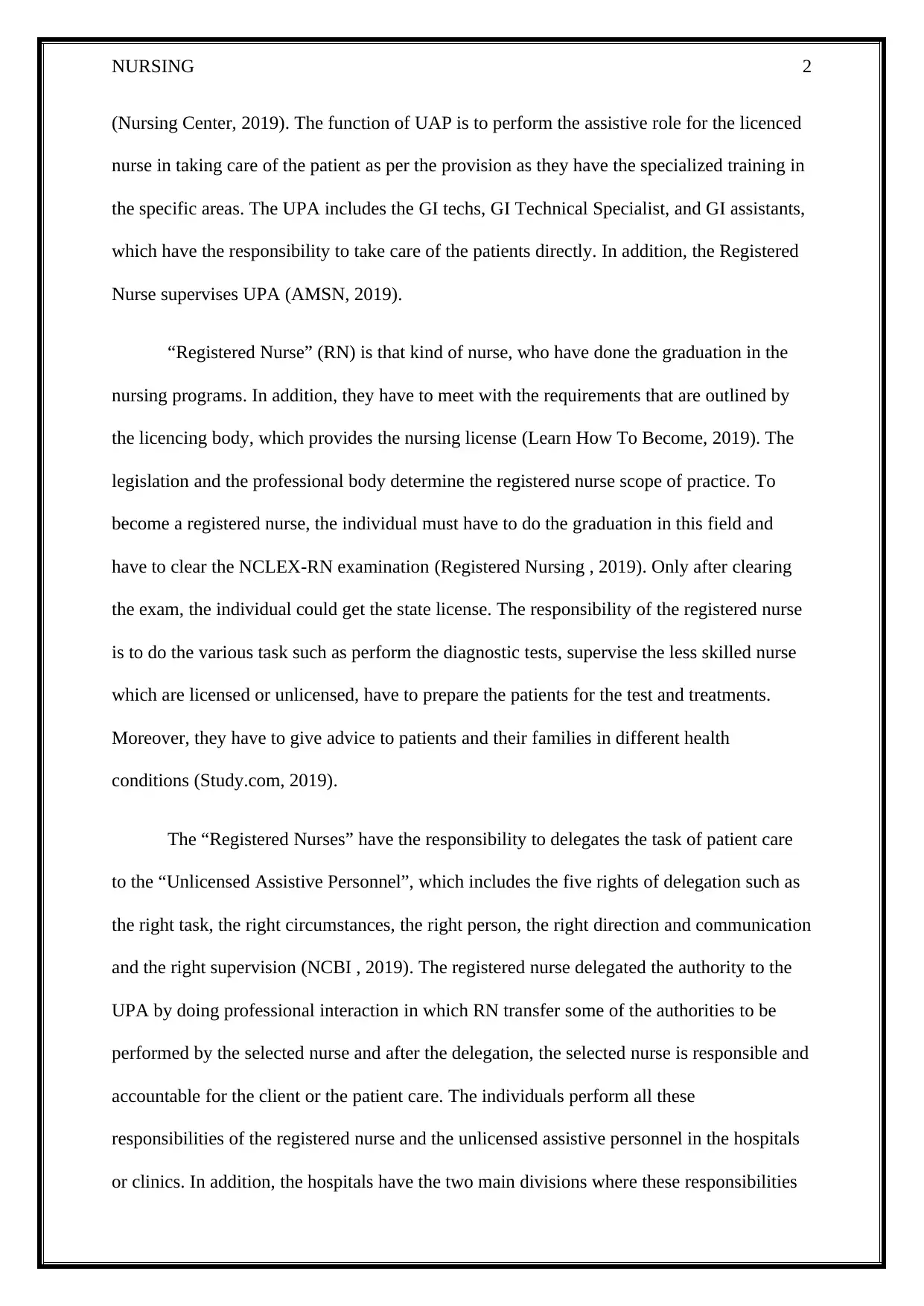
NURSING 2
(Nursing Center, 2019). The function of UAP is to perform the assistive role for the licenced
nurse in taking care of the patient as per the provision as they have the specialized training in
the specific areas. The UPA includes the GI techs, GI Technical Specialist, and GI assistants,
which have the responsibility to take care of the patients directly. In addition, the Registered
Nurse supervises UPA (AMSN, 2019).
“Registered Nurse” (RN) is that kind of nurse, who have done the graduation in the
nursing programs. In addition, they have to meet with the requirements that are outlined by
the licencing body, which provides the nursing license (Learn How To Become, 2019). The
legislation and the professional body determine the registered nurse scope of practice. To
become a registered nurse, the individual must have to do the graduation in this field and
have to clear the NCLEX-RN examination (Registered Nursing , 2019). Only after clearing
the exam, the individual could get the state license. The responsibility of the registered nurse
is to do the various task such as perform the diagnostic tests, supervise the less skilled nurse
which are licensed or unlicensed, have to prepare the patients for the test and treatments.
Moreover, they have to give advice to patients and their families in different health
conditions (Study.com, 2019).
The “Registered Nurses” have the responsibility to delegates the task of patient care
to the “Unlicensed Assistive Personnel”, which includes the five rights of delegation such as
the right task, the right circumstances, the right person, the right direction and communication
and the right supervision (NCBI , 2019). The registered nurse delegated the authority to the
UPA by doing professional interaction in which RN transfer some of the authorities to be
performed by the selected nurse and after the delegation, the selected nurse is responsible and
accountable for the client or the patient care. The individuals perform all these
responsibilities of the registered nurse and the unlicensed assistive personnel in the hospitals
or clinics. In addition, the hospitals have the two main divisions where these responsibilities
(Nursing Center, 2019). The function of UAP is to perform the assistive role for the licenced
nurse in taking care of the patient as per the provision as they have the specialized training in
the specific areas. The UPA includes the GI techs, GI Technical Specialist, and GI assistants,
which have the responsibility to take care of the patients directly. In addition, the Registered
Nurse supervises UPA (AMSN, 2019).
“Registered Nurse” (RN) is that kind of nurse, who have done the graduation in the
nursing programs. In addition, they have to meet with the requirements that are outlined by
the licencing body, which provides the nursing license (Learn How To Become, 2019). The
legislation and the professional body determine the registered nurse scope of practice. To
become a registered nurse, the individual must have to do the graduation in this field and
have to clear the NCLEX-RN examination (Registered Nursing , 2019). Only after clearing
the exam, the individual could get the state license. The responsibility of the registered nurse
is to do the various task such as perform the diagnostic tests, supervise the less skilled nurse
which are licensed or unlicensed, have to prepare the patients for the test and treatments.
Moreover, they have to give advice to patients and their families in different health
conditions (Study.com, 2019).
The “Registered Nurses” have the responsibility to delegates the task of patient care
to the “Unlicensed Assistive Personnel”, which includes the five rights of delegation such as
the right task, the right circumstances, the right person, the right direction and communication
and the right supervision (NCBI , 2019). The registered nurse delegated the authority to the
UPA by doing professional interaction in which RN transfer some of the authorities to be
performed by the selected nurse and after the delegation, the selected nurse is responsible and
accountable for the client or the patient care. The individuals perform all these
responsibilities of the registered nurse and the unlicensed assistive personnel in the hospitals
or clinics. In addition, the hospitals have the two main divisions where these responsibilities
⊘ This is a preview!⊘
Do you want full access?
Subscribe today to unlock all pages.

Trusted by 1+ million students worldwide
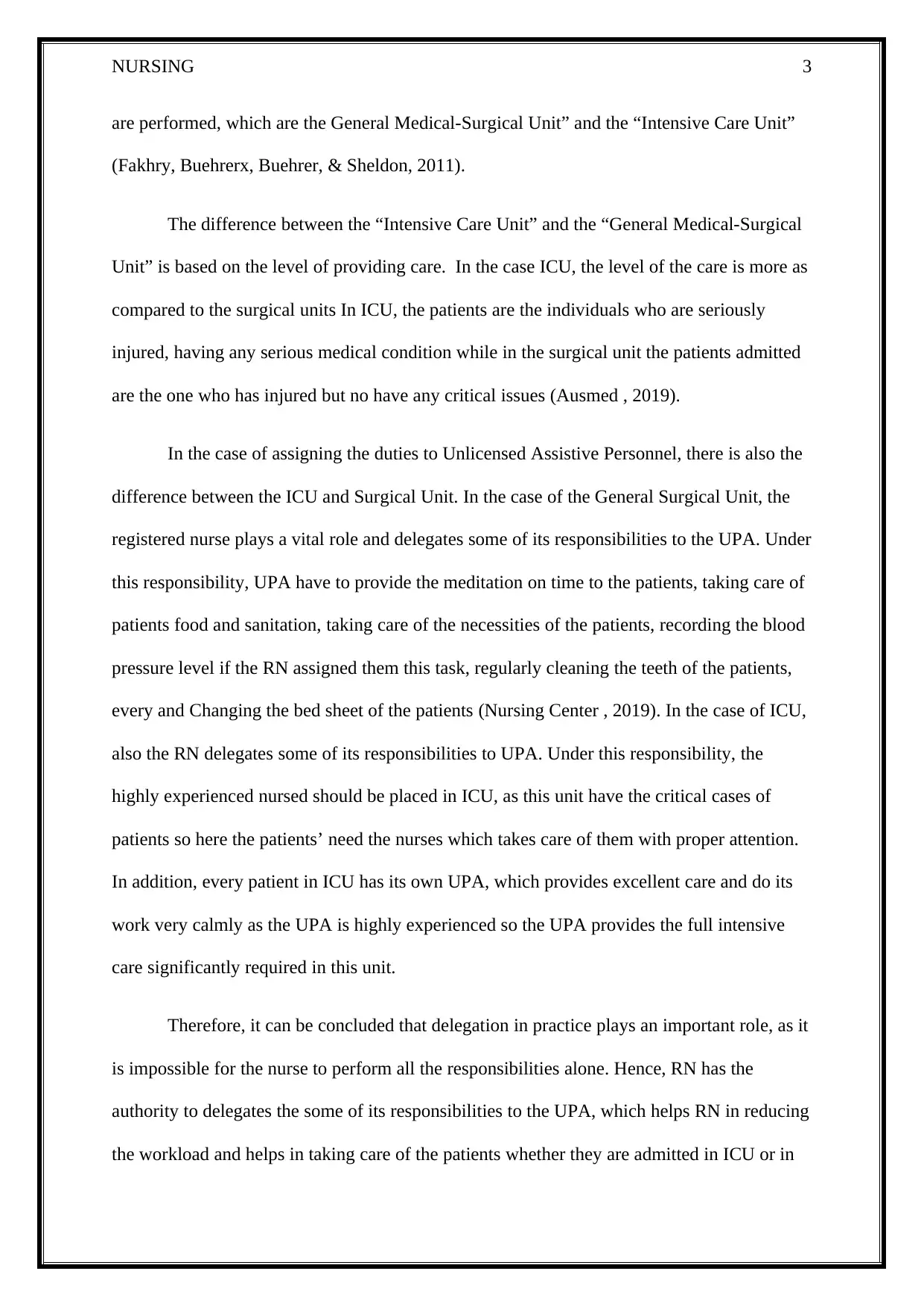
NURSING 3
are performed, which are the General Medical-Surgical Unit” and the “Intensive Care Unit”
(Fakhry, Buehrerx, Buehrer, & Sheldon, 2011).
The difference between the “Intensive Care Unit” and the “General Medical-Surgical
Unit” is based on the level of providing care. In the case ICU, the level of the care is more as
compared to the surgical units In ICU, the patients are the individuals who are seriously
injured, having any serious medical condition while in the surgical unit the patients admitted
are the one who has injured but no have any critical issues (Ausmed , 2019).
In the case of assigning the duties to Unlicensed Assistive Personnel, there is also the
difference between the ICU and Surgical Unit. In the case of the General Surgical Unit, the
registered nurse plays a vital role and delegates some of its responsibilities to the UPA. Under
this responsibility, UPA have to provide the meditation on time to the patients, taking care of
patients food and sanitation, taking care of the necessities of the patients, recording the blood
pressure level if the RN assigned them this task, regularly cleaning the teeth of the patients,
every and Changing the bed sheet of the patients (Nursing Center , 2019). In the case of ICU,
also the RN delegates some of its responsibilities to UPA. Under this responsibility, the
highly experienced nursed should be placed in ICU, as this unit have the critical cases of
patients so here the patients’ need the nurses which takes care of them with proper attention.
In addition, every patient in ICU has its own UPA, which provides excellent care and do its
work very calmly as the UPA is highly experienced so the UPA provides the full intensive
care significantly required in this unit.
Therefore, it can be concluded that delegation in practice plays an important role, as it
is impossible for the nurse to perform all the responsibilities alone. Hence, RN has the
authority to delegates the some of its responsibilities to the UPA, which helps RN in reducing
the workload and helps in taking care of the patients whether they are admitted in ICU or in
are performed, which are the General Medical-Surgical Unit” and the “Intensive Care Unit”
(Fakhry, Buehrerx, Buehrer, & Sheldon, 2011).
The difference between the “Intensive Care Unit” and the “General Medical-Surgical
Unit” is based on the level of providing care. In the case ICU, the level of the care is more as
compared to the surgical units In ICU, the patients are the individuals who are seriously
injured, having any serious medical condition while in the surgical unit the patients admitted
are the one who has injured but no have any critical issues (Ausmed , 2019).
In the case of assigning the duties to Unlicensed Assistive Personnel, there is also the
difference between the ICU and Surgical Unit. In the case of the General Surgical Unit, the
registered nurse plays a vital role and delegates some of its responsibilities to the UPA. Under
this responsibility, UPA have to provide the meditation on time to the patients, taking care of
patients food and sanitation, taking care of the necessities of the patients, recording the blood
pressure level if the RN assigned them this task, regularly cleaning the teeth of the patients,
every and Changing the bed sheet of the patients (Nursing Center , 2019). In the case of ICU,
also the RN delegates some of its responsibilities to UPA. Under this responsibility, the
highly experienced nursed should be placed in ICU, as this unit have the critical cases of
patients so here the patients’ need the nurses which takes care of them with proper attention.
In addition, every patient in ICU has its own UPA, which provides excellent care and do its
work very calmly as the UPA is highly experienced so the UPA provides the full intensive
care significantly required in this unit.
Therefore, it can be concluded that delegation in practice plays an important role, as it
is impossible for the nurse to perform all the responsibilities alone. Hence, RN has the
authority to delegates the some of its responsibilities to the UPA, which helps RN in reducing
the workload and helps in taking care of the patients whether they are admitted in ICU or in
Paraphrase This Document
Need a fresh take? Get an instant paraphrase of this document with our AI Paraphraser
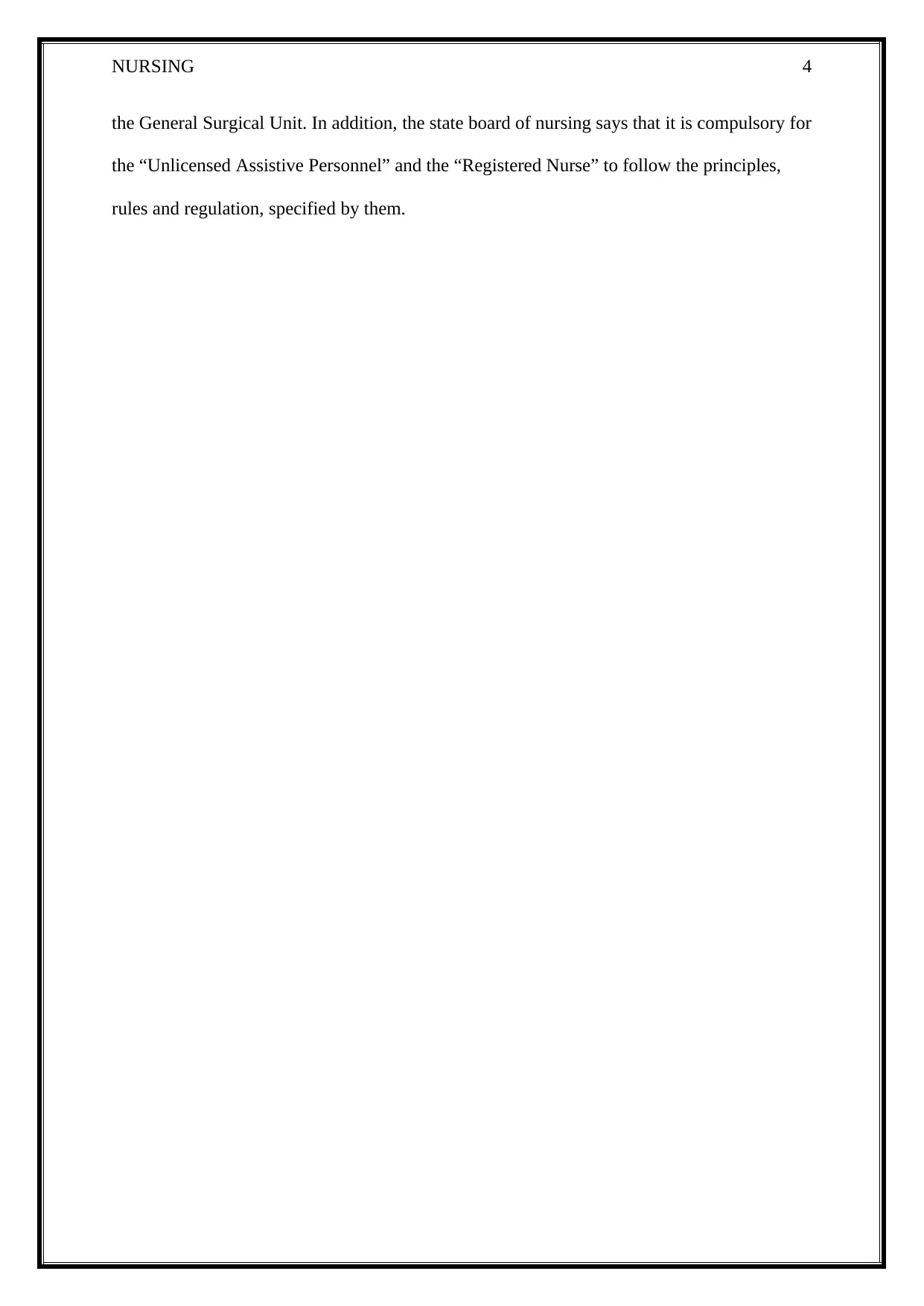
NURSING 4
the General Surgical Unit. In addition, the state board of nursing says that it is compulsory for
the “Unlicensed Assistive Personnel” and the “Registered Nurse” to follow the principles,
rules and regulation, specified by them.
the General Surgical Unit. In addition, the state board of nursing says that it is compulsory for
the “Unlicensed Assistive Personnel” and the “Registered Nurse” to follow the principles,
rules and regulation, specified by them.
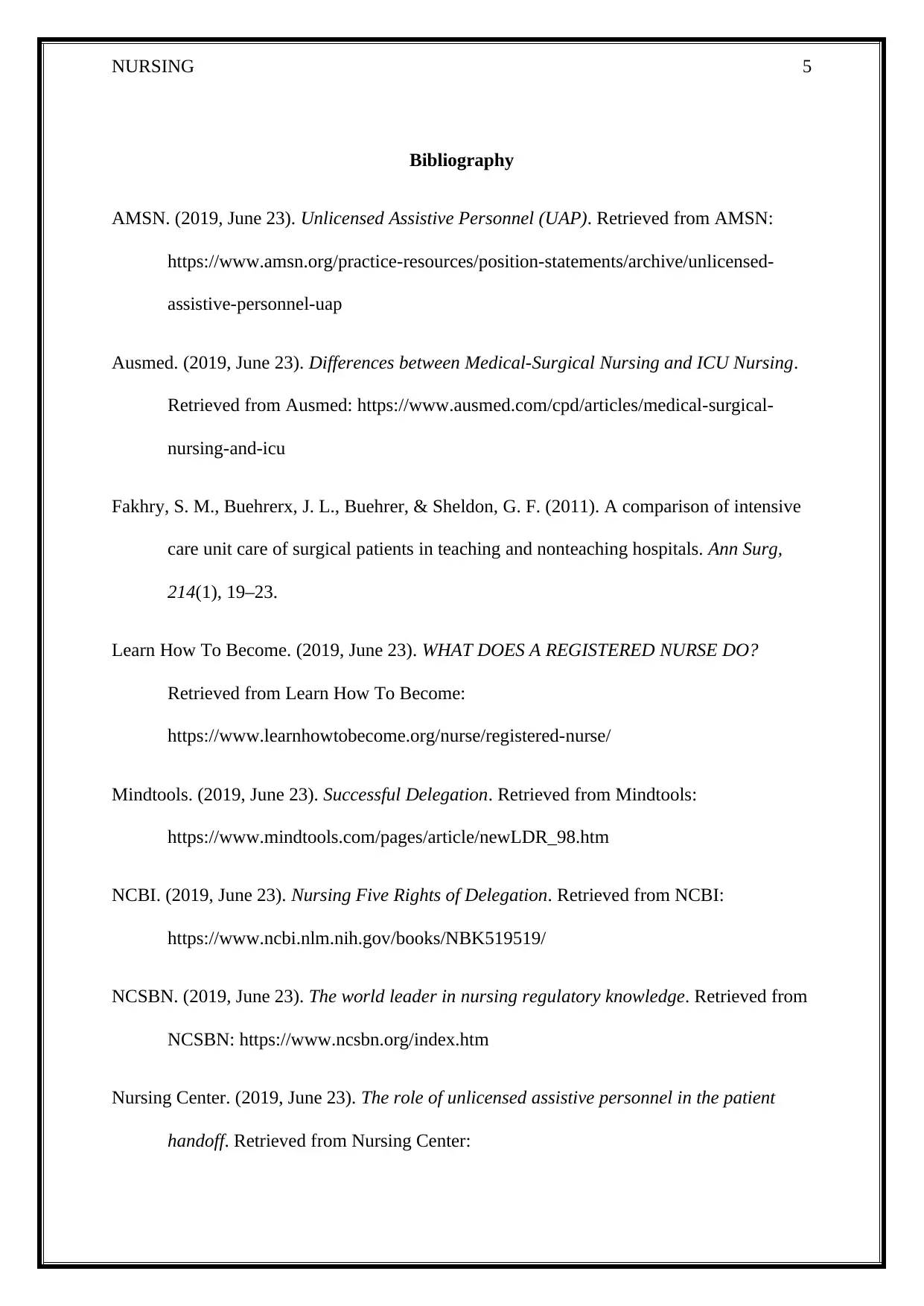
NURSING 5
Bibliography
AMSN. (2019, June 23). Unlicensed Assistive Personnel (UAP). Retrieved from AMSN:
https://www.amsn.org/practice-resources/position-statements/archive/unlicensed-
assistive-personnel-uap
Ausmed. (2019, June 23). Differences between Medical-Surgical Nursing and ICU Nursing.
Retrieved from Ausmed: https://www.ausmed.com/cpd/articles/medical-surgical-
nursing-and-icu
Fakhry, S. M., Buehrerx, J. L., Buehrer, & Sheldon, G. F. (2011). A comparison of intensive
care unit care of surgical patients in teaching and nonteaching hospitals. Ann Surg,
214(1), 19–23.
Learn How To Become. (2019, June 23). WHAT DOES A REGISTERED NURSE DO?
Retrieved from Learn How To Become:
https://www.learnhowtobecome.org/nurse/registered-nurse/
Mindtools. (2019, June 23). Successful Delegation. Retrieved from Mindtools:
https://www.mindtools.com/pages/article/newLDR_98.htm
NCBI. (2019, June 23). Nursing Five Rights of Delegation. Retrieved from NCBI:
https://www.ncbi.nlm.nih.gov/books/NBK519519/
NCSBN. (2019, June 23). The world leader in nursing regulatory knowledge. Retrieved from
NCSBN: https://www.ncsbn.org/index.htm
Nursing Center. (2019, June 23). The role of unlicensed assistive personnel in the patient
handoff. Retrieved from Nursing Center:
Bibliography
AMSN. (2019, June 23). Unlicensed Assistive Personnel (UAP). Retrieved from AMSN:
https://www.amsn.org/practice-resources/position-statements/archive/unlicensed-
assistive-personnel-uap
Ausmed. (2019, June 23). Differences between Medical-Surgical Nursing and ICU Nursing.
Retrieved from Ausmed: https://www.ausmed.com/cpd/articles/medical-surgical-
nursing-and-icu
Fakhry, S. M., Buehrerx, J. L., Buehrer, & Sheldon, G. F. (2011). A comparison of intensive
care unit care of surgical patients in teaching and nonteaching hospitals. Ann Surg,
214(1), 19–23.
Learn How To Become. (2019, June 23). WHAT DOES A REGISTERED NURSE DO?
Retrieved from Learn How To Become:
https://www.learnhowtobecome.org/nurse/registered-nurse/
Mindtools. (2019, June 23). Successful Delegation. Retrieved from Mindtools:
https://www.mindtools.com/pages/article/newLDR_98.htm
NCBI. (2019, June 23). Nursing Five Rights of Delegation. Retrieved from NCBI:
https://www.ncbi.nlm.nih.gov/books/NBK519519/
NCSBN. (2019, June 23). The world leader in nursing regulatory knowledge. Retrieved from
NCSBN: https://www.ncsbn.org/index.htm
Nursing Center. (2019, June 23). The role of unlicensed assistive personnel in the patient
handoff. Retrieved from Nursing Center:
⊘ This is a preview!⊘
Do you want full access?
Subscribe today to unlock all pages.

Trusted by 1+ million students worldwide
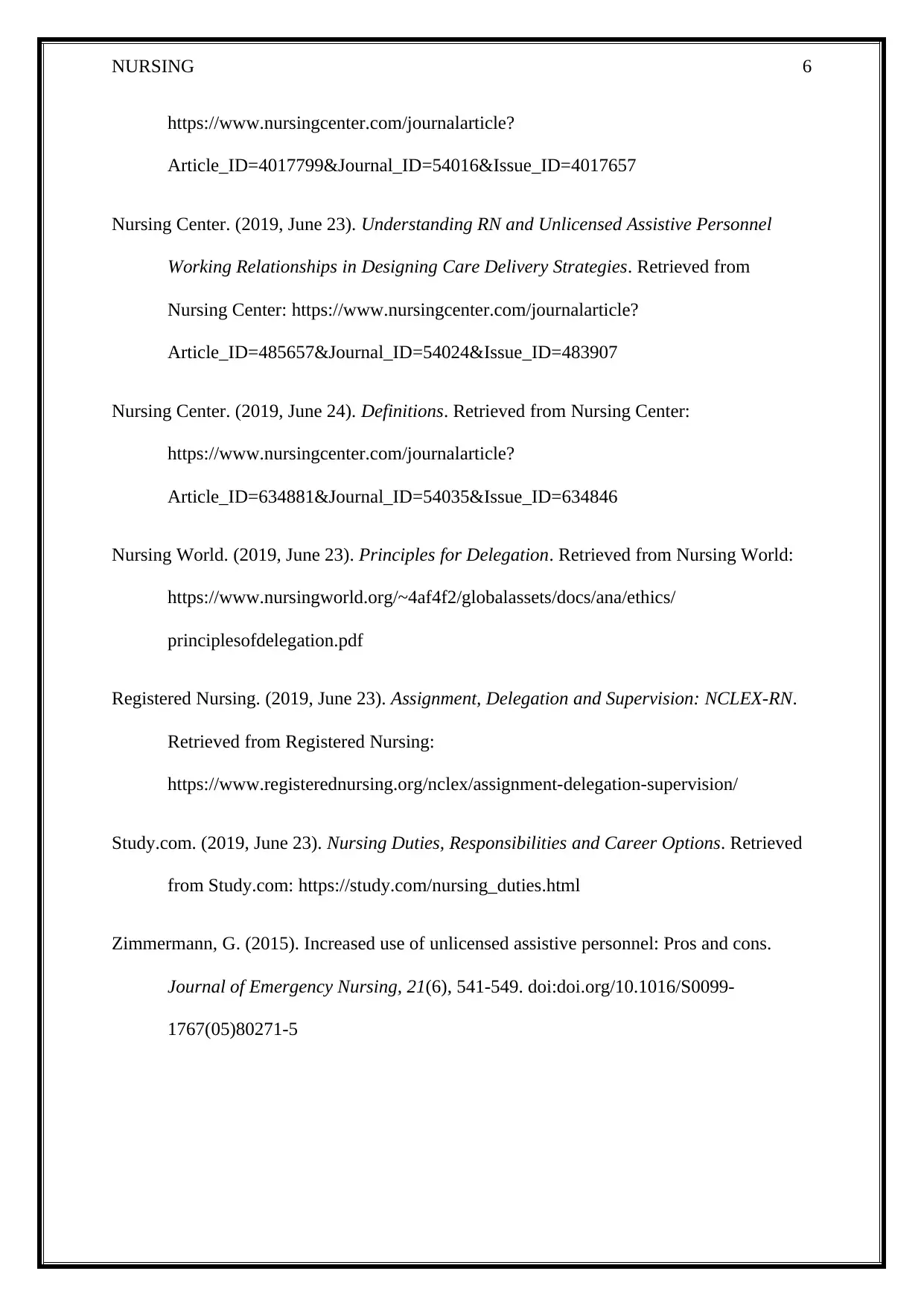
NURSING 6
https://www.nursingcenter.com/journalarticle?
Article_ID=4017799&Journal_ID=54016&Issue_ID=4017657
Nursing Center. (2019, June 23). Understanding RN and Unlicensed Assistive Personnel
Working Relationships in Designing Care Delivery Strategies. Retrieved from
Nursing Center: https://www.nursingcenter.com/journalarticle?
Article_ID=485657&Journal_ID=54024&Issue_ID=483907
Nursing Center. (2019, June 24). Definitions. Retrieved from Nursing Center:
https://www.nursingcenter.com/journalarticle?
Article_ID=634881&Journal_ID=54035&Issue_ID=634846
Nursing World. (2019, June 23). Principles for Delegation. Retrieved from Nursing World:
https://www.nursingworld.org/~4af4f2/globalassets/docs/ana/ethics/
principlesofdelegation.pdf
Registered Nursing. (2019, June 23). Assignment, Delegation and Supervision: NCLEX-RN.
Retrieved from Registered Nursing:
https://www.registerednursing.org/nclex/assignment-delegation-supervision/
Study.com. (2019, June 23). Nursing Duties, Responsibilities and Career Options. Retrieved
from Study.com: https://study.com/nursing_duties.html
Zimmermann, G. (2015). Increased use of unlicensed assistive personnel: Pros and cons.
Journal of Emergency Nursing, 21(6), 541-549. doi:doi.org/10.1016/S0099-
1767(05)80271-5
https://www.nursingcenter.com/journalarticle?
Article_ID=4017799&Journal_ID=54016&Issue_ID=4017657
Nursing Center. (2019, June 23). Understanding RN and Unlicensed Assistive Personnel
Working Relationships in Designing Care Delivery Strategies. Retrieved from
Nursing Center: https://www.nursingcenter.com/journalarticle?
Article_ID=485657&Journal_ID=54024&Issue_ID=483907
Nursing Center. (2019, June 24). Definitions. Retrieved from Nursing Center:
https://www.nursingcenter.com/journalarticle?
Article_ID=634881&Journal_ID=54035&Issue_ID=634846
Nursing World. (2019, June 23). Principles for Delegation. Retrieved from Nursing World:
https://www.nursingworld.org/~4af4f2/globalassets/docs/ana/ethics/
principlesofdelegation.pdf
Registered Nursing. (2019, June 23). Assignment, Delegation and Supervision: NCLEX-RN.
Retrieved from Registered Nursing:
https://www.registerednursing.org/nclex/assignment-delegation-supervision/
Study.com. (2019, June 23). Nursing Duties, Responsibilities and Career Options. Retrieved
from Study.com: https://study.com/nursing_duties.html
Zimmermann, G. (2015). Increased use of unlicensed assistive personnel: Pros and cons.
Journal of Emergency Nursing, 21(6), 541-549. doi:doi.org/10.1016/S0099-
1767(05)80271-5
1 out of 7
Related Documents
Your All-in-One AI-Powered Toolkit for Academic Success.
+13062052269
info@desklib.com
Available 24*7 on WhatsApp / Email
![[object Object]](/_next/static/media/star-bottom.7253800d.svg)
Unlock your academic potential
Copyright © 2020–2026 A2Z Services. All Rights Reserved. Developed and managed by ZUCOL.





